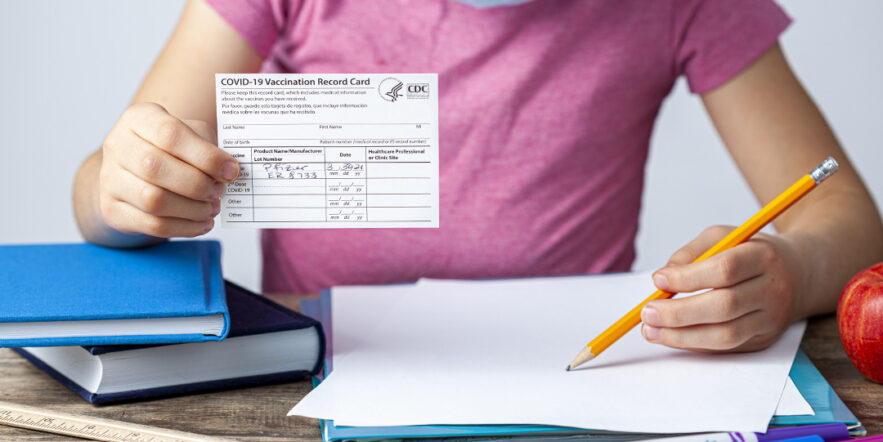On May 10, 2021 Pfizer announced that its COVID-19 vaccine had been granted emergency-use authorization for kids ages 12 to 15. Since then, lower doses of the shot have been authorized for children aged 6-11. Many children have received the vaccinations, but a large population of children without the shots remains, as officials report a new variant could cause a small, but noticeable new wave of cases soon.
With the FDA reviewing data from Moderna’s trials and Pfizer extending its trial to include a third shot in hopes of coaxing a more robust immune response in children 6 months to 5 years old, you’ll likely being seeing headlines about COVID vaccines for a while longer.
Two of MedShadow’s Medical Advisory Board members, Kevin Zacharoff, MD, a pain and preventive medicine specialist at Stony Brook University, who is also a member of the American Academy of Pediatrics, and Vickie Karian, RN, a pediatric nurse practitioner at Boston Children’s Hospital, answered our questions, which aim to help you make the best decision for your family.
- What do we know about how the virus affects children and those around them? Also, is what we know changing?
Zacharoff: More than 1.5 million adolescents ages 12 to 17 have been diagnosed with COVID-19, with more than 13,000 of them needing to be hospitalized. What this means, is that if we consider that as many as five to 10 times the number of diagnosed cases may be the actual number of asymptomatic cases of infection, we are talking about a significant population at risk. I don’t think we know what that means to those around them. What we do know is that information is changing all the time.
Karian: For the majority of children with the COVID-19 virus, the cases are mild or asymptomatic and do not need hospitalization or specialized care. Some children do develop a severe COVID-19 illness and these tend to be those children and adolescents who have underlying conditions that make them susceptible, which is similar to adults. Another group between the ages of 1 and 14 can develop the rare multisystem inflammatory syndrome, or MIS-C. These patients need hospitalization, and often critical care. MIS-C can appear a month after a COVID-19 infection, mostly in children who are healthy and often test positive to COVID-19, but are asymptomatic. MIS-C can inflame different parts of the body, including the heart, lungs, brain and gastrointestinal system, with a variety of symptoms, such as abdominal pain to diarrhea or other systemic illness. Mortality is very low, but there can be some longer-term morbidity, with some children needing rehabilitation or supportive care at home. There is also now evidence that some children and adolescents can develop long-term symptoms, including headache, muscle and joint aches, fatigue, trouble sleeping or concentrating.
- Is there reason to believe the COVID vaccine for kids and teens would cause different (or more- or less-intense side effects) than it does for adults?
Karian: In the adolescents studied, there were similar side effects to those experienced by young adults, especially [after] the second dose. Many had pain at the injection site (91%), and within 24 hours, experienced fatigue (78%), headache (76%), chills (48%), muscle pain (42%) and, less frequently, fever, joint pain or nausea. Side effects are related to mounting an immune response, but not having symptoms does not mean the person’s [body] is not also mounting a response.
Zacharoff: As of December 2021, there were only 8 reported cases of post-vaccine myocarditis out of 7 million COVID-19 vaccines administered, with the risk of myocarditis in unvaccinated children and young adults approximately 6 times higher than vaccinated children.
- Are there any contraindications specific to children and teens?
Zacharoff: The contraindications seem to be the same as those for adults; vaccination should only take place after a discussion with the child’s pediatrician. If there is any medical history of being immune-compromised (being more susceptible to infections, for example), the decision [should] be made on a case-by-case basis, again, with the child’s pediatrician and other physicians [or both] caring for the child.
Karian: Allergy to any of the ingredients is a contraindication for anyone. Also individual consideration needs to be given regarding any child with an underlying health condition or a compromised immune system. Many of these patients would benefit from receiving the vaccine, but may have trouble mounting an immune response. They might actually require extra dosing to ensure protection from the virus. All decisions regarding vaccination should be done in consultation with the child’s health care provider to make the right decision to protect the child’s health.
- What is your advice to parents about when to get the COVID vaccine for their kids?
Karian: Vaccinate your children to protect yourself, your family, their schoolmates and teachers, and to protect those in society who are vulnerable. People can still be infected with the virus, even if vaccinated, but generally the illness will be much milder. We have seen over time that the vaccines are quite safe and offer significant protection from the virus for the child, family and society. The disruption in the educational system has had an overall negative effect of our children’s mental and physical health. Vaccination is our way back to more normal functioning.
Zacharoff: My advice to parents would be to use the same judgment about the decision to vaccinate as they would for themselves, especially in light of the data regarding risk of severe illness in vaccinated vs. unvaccinated individuals. I completely understand the concerns about all of the unknowns we still have today regarding the coronavirus pandemic and the desire to know more before we make important decisions about our own and, especially, our children’s health. One thing that we need to strongly consider is the potentially negative social and psychological impact that the pandemic has had on children and consider that as an adverse effect, too. With nothing else really on the horizon, it continues to seem as if vaccination is the single best answer we have right now, and that means that the time for “when” is now.
I also highly recommend that parents and caregivers review and take advantage of obtaining information from CDC Resources about COVID-19 vaccination for children and teens which are available here and the American Academy of Pediatrics recommendations for why COVID-19 vaccines are important for children here.






